🐎 "The War of the Rohirrim" Spoiler-Free Review: A Serviceable, Not Stupendous, Return to Rohan
While parts are enjoyable, their sum fails to reach the franchise’s previous cinematic heights
Hello all!
Today I have some thoughts on Warner Bros. new animated Lord of the Rings movie, The War of the Rohirrim, which I saw Sunday night.
This review is spoiler-free so that you can get a sense of my thoughts without any major spoilers if you’re planning to see it soon.
The War of the Rohirrim Spoiler-Free Review
I enjoyed many of the elements of The War of the Rohirrim, which adapts approximately three pages of material on the story of Helm Hammerhand from Appendix A of The Lord of the Rings into a 2 hour and 14 minute film.
I liked the main cast of characters, from Helm Hammerhand to Héra and her brothers (Háma and Haleth). Héra’s guardian Olwyn (who I particularly enjoyed), Lief the new herald, and Héra’s cousin Fréaláf were also all well-rounded and likeable characters. Additionally, Wulf was a credibly threatening villain driven by a tireless vengeance that at times bordered on unbelievable but never jumped the shark into ridiculous or implausible.
I thought it was an inspired choice to make this an animated film: animation is such a natural fit for fantasy stories and I hope this is the first of a new wave of many animated The Lord of the Rings and other related or inspired fantasy films.
And I loved experiencing Middle-earth in the cinema again,1 especially in December. There’s something that just feels especially right about The Lord of the Rings at Christmastime.
But something about the movie just didn’t ‘click’ for me. Though the soundtrack samples Howard Shore’s masterpiece of a score in several places (notably during the Overture), the original music was by and large underwhelming, even approaching distracting in several scenes. Most Easter Eggs, including two involving cameos or mentions of some familiar magical faces/names, failed to stir anything approaching excitement in me. Several crowd scenes that were supposed to depict fearsome or inspiring forces were underwhelming: the total number of figures in these scenes were sparse compared to my expectations, which left me wondering if there would be more appearing or if that was it.
The Heart of the Matter
In talking about the movie with my wife immediately after I got back from the showing, she asked what I felt was missing. And the answer, I think, is heart. The ‘emotional core’ of the movie is not its strongest point. Yes, Héra is a likeable protagonist. (And I’m happy to report that any and all fears that turning this character Tolkien leaves unnamed into the protagonist of the film is an “agenda-driven mistake” that is somehow “disrespecting Tolkien” are completely unfounded.) But though she is fighting to preserve her family and her nation…I was left a bit on the outside of that fight emotionally.
Perhaps I will warm to it upon future viewings. And maybe that’s more of an individual issue for me than an issue with the film itself. But one of the reasons for the success of The Lord of the Rings both in print and on-screen is that we experience the story through the vantage point of the Hobbits. Their love for “peace and quiet, and good tilled earth…[and] things that grow” is relatable, as are their reactions to being thrust into the middle of events entirely beyond their experience and ability to comprehend or (seemingly) affect. It is in their experience of Middle-earth that we are drawn into and become invested in the story. It’s why we care about Middle-earth: because the Shire is worth saving.
The War of the Rohirrim did not produce the same level of investment in me. The story of Helm as written in Appendix A reads (appropriately) like a history tome. So it falls to the filmmakers to flesh out the events and give us a reason to be invested in what is occurring onscreen. But the results were not entirely successful. I won’t go so far as to call it soulless (as I’ve seen in some reviews). But I didn’t leave the theater excited or thrilled.
To be clear, I enjoyed the film. It didn’t leave me disappointed, exactly. But I also have little desire to see it again immediately or even in the near future. If anything, it makes me want to throw on The Two Towers and/or The Return of the King instead.2 Which perhaps is not the worst thing in the world to be left with as a takeaway.
So while I enjoyed aspects of it, The War of the Rohirrim never came together for me, seeming content to echo some of the best of Peter Jackson’s trilogy without the heart and inspiration that make those films sing.
So, should you see it?
If you’re a Lord of the Rings fan (and let’s face it, the fact that you’re reading this indicates you almost certainly are) then I think you’ll find the movie a fine way to spend an afternoon or evening. By all means go see it in the theater! There’s definitely a good bit to like about the film. But don’t go in expecting the same heights as the films it draws so deeply from or you may leave disappointed.
And don’t feel like you’re necessarily missing out if you choose to wait for it to come to streaming. After all, you can marathon the movies it is attempting to channel in the meantime.
For Discussion
Already seen the movie? What did you think?
Want to discuss spoilers (using spoiler-tags) or hear more of my in-depth thoughts? Join the conversation on the Jokien with Tolkien Discord!
🎁 Tolkien Gift Guide — 2024
Just a few days left to order gifts that will arrive in time for Christmas! If you haven't yet or meant to come back to it, check out my gift guide here
Appendices
Per Deadline, The War of the Rohirrim only made $4.6 million its opening weekend. Its budget was just $30 million, but that’s still a disappointing number for the film. Variety claims the film “was developed and fast-tracked to ensure that New Line Cinema didn’t lose the film adaptation rights for Tolkien’s novels while Jackson and the teams behind the ‘Lord of the Rings’ and ‘Hobbit’ trilogies were working on two new live-action films for 2026 and beyond,” so financial success wasn’t necessarily the main goal of the film. Whatever the reason, if you go it’s likely that you (like I was) will be one of a handful of people in your particular showing.
Thanks to Extended Edition members for supporting this newsletter and making it possible for me to go see the film and share my thoughts with everyone! If you regularly get value, entertainment, encouragement, or inspiration from this newsletter, consider upgrading your subscription and supporting this newsletter for just $5 a month (or less at the annual rate)!
📚 You can read more of my writing by reading my books! My latest is a collection of essays on The Lord of the Rings, The Silmarillion, and more of Tolkien’s works (and their adaptations). You can find it and more of my books on Amazon or Gumroad
⚔️ If someone forwarded this email to you or you found it through social media or Google, I’d like to invite you to join 11,000+ subscribers in the Jokien with Tolkien community: Subscribe here and get a free gift just for joining!
🏹 Chosen as a Substack Featured Publication in 2023
🪓 Official merch available in the Jokien with Tolkien store
❌ All typos are precisely as intended
🔗 Links may be affiliate, which is a free-to-you way to support this newsletter where I earn a small commission on items you purchase
🗃️ Can’t wait till next week for more content? View the archive
🎯 Interested in writing a guest piece like the above? Check out my submission guidelines. Want to sponsor an issue? Email me at JRRJokien@JRRJokien.com
I was not lucky enough to catch any of the episodes of Rings of Power when they were in theaters for special events
Who am I kidding, gotta watch all three haha



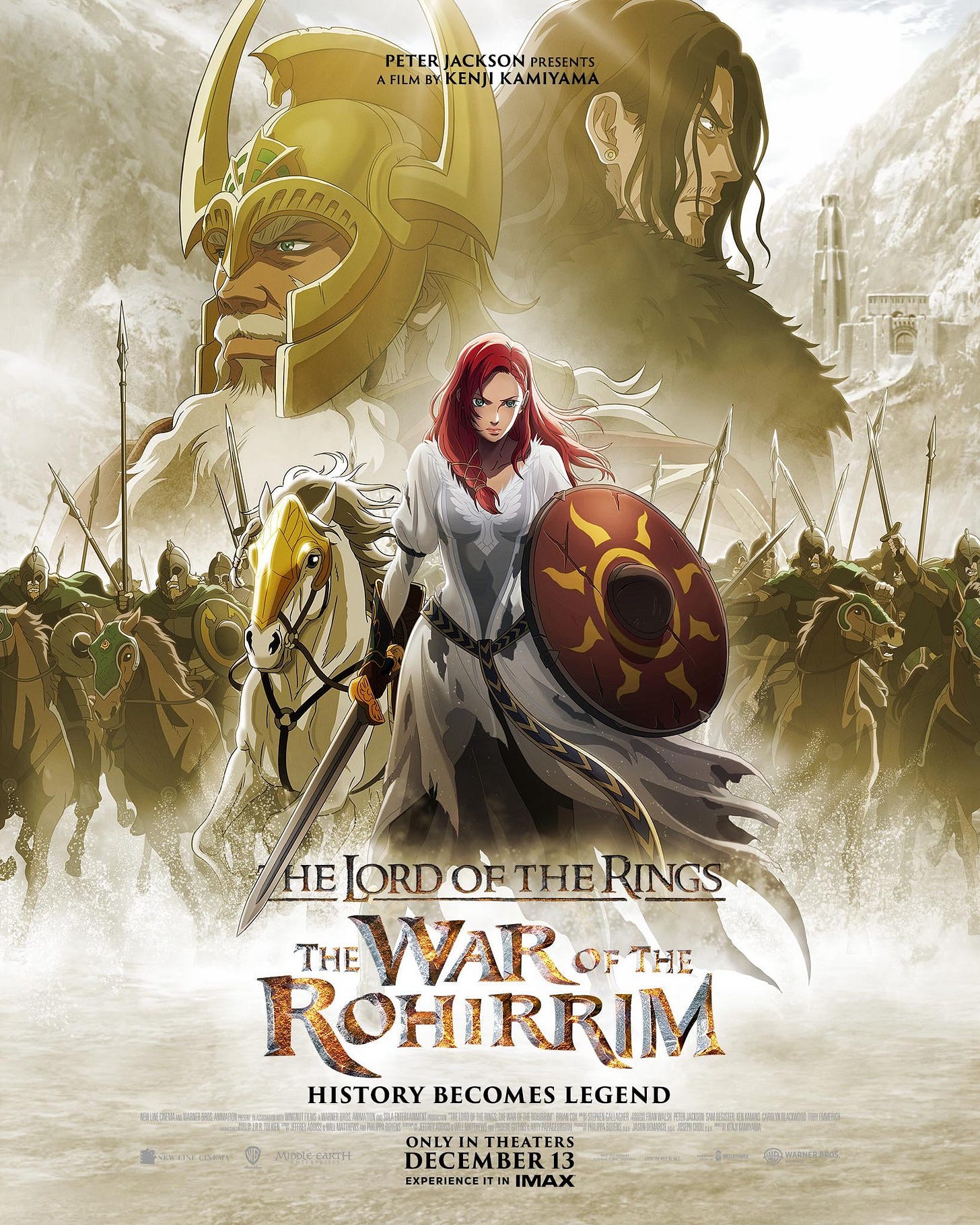
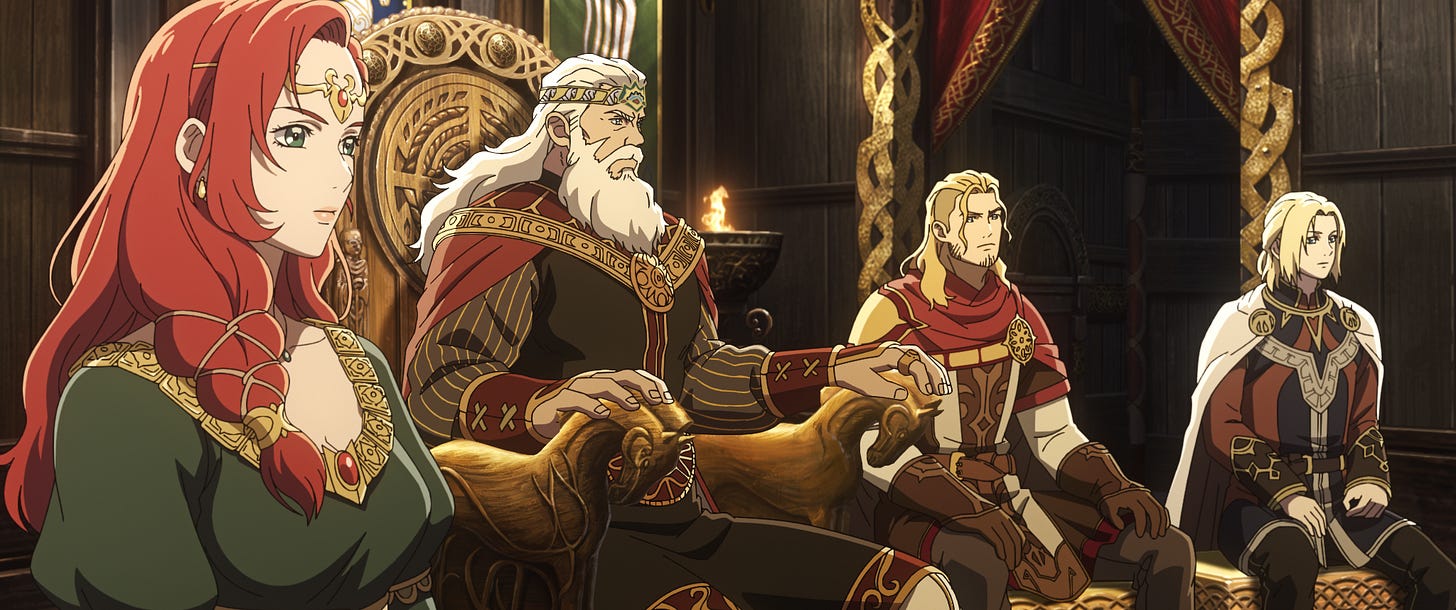
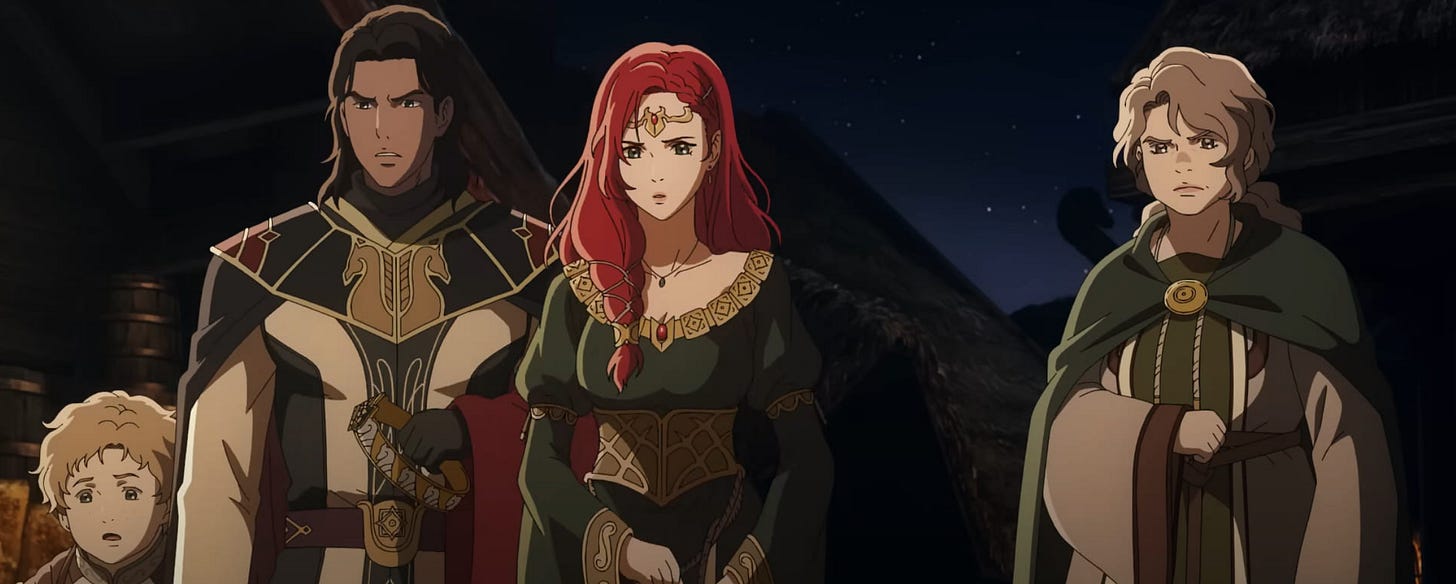


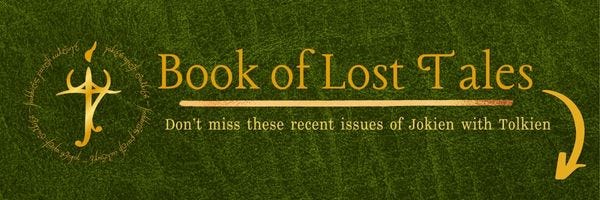
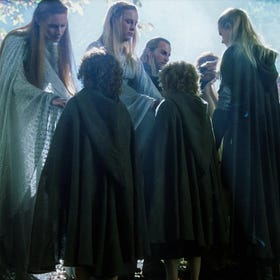


The difference between Tolkien and the writers who come after him can be stated as the difference between “I am no man” and “I need no man”… I disagree with you that it was not agenda-driven - even allowing for the fact that portions of the plot are similar to what Tolkien wrote in the Appendix, Wulf’s motivations toward the end seem to be more about getting revenge upon “her” and proving himself better than Héra (which he predictably fails at). He’s acting like an incel who’s been rejected by the Strong Feminist heroine. Thus Héra’s defeat of Wulf seems like the perfect feminist comeback to patriarchy and toxic incel culture. Thanks, but Tolkien already managed to make strong female characters who still loved males and got married, so there’s no need to try and convince me that these two things are mutually exclusive.
Also, Héra’s motivations remain exactly the same from start to finish, and she is exceptionally good at everything from swordfighting to mountaineering. Mary Sue, anyone?
P.S. Did they have to rip off Éowyn and make the feminist rejection so on the nose with that scene? You know the one I’m talking about.
I enjoyed it and will watch it again! I went into it already invested in Rohan where it sounds like you didn't (or at least not as much), and I wasn't expecting it to be a big-budget epic.